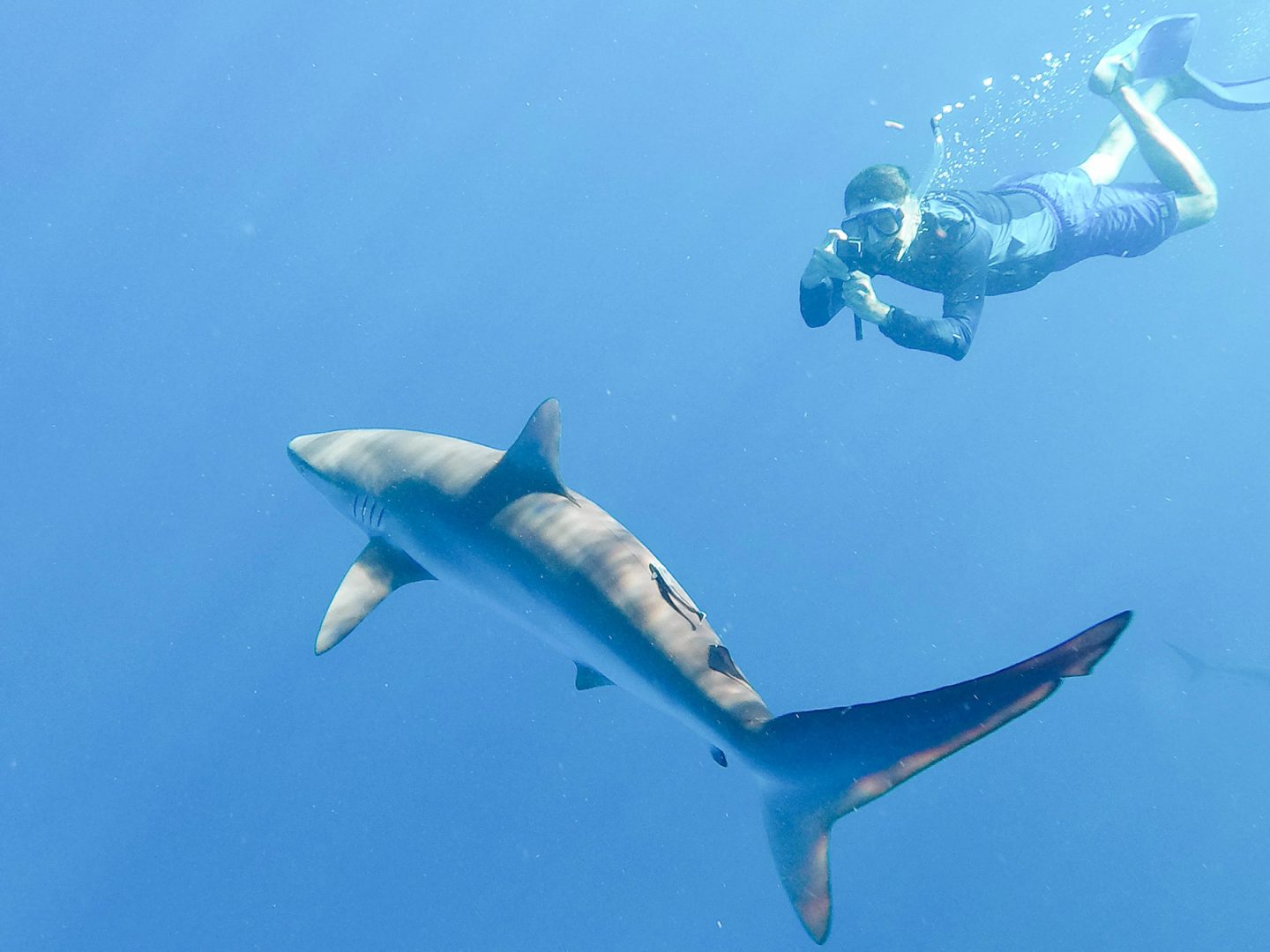Associate Professor of Biology and Marine Science William Szelistowski (“Ski”) dives down for a closer photograph of a silky shark. Photo: Bjorn Peterson ’20, from the 2018 Winter Term Photo Contest
They were all prepared. Students in Associate Professor of Biology and Marine Science William Szelistowski’s “Elasmobranch Biology and Management” and “Biology of Fishes” classes were going to travel to the Bahamas to do hands-on research with 10 different shark species in the spring of 2020.
Then the world shut down for the pandemic, and they thought they had lost their chance. With help from the new Associate Dean of Global Education Thandiwe Dinani, Ph.D., two-thirds of those students will still make their dream trip to the Bimini Shark Research Lab in January 2022 for Winter Term.
“I got in again,” says Matt Hellerman, a senior marine science student from Ashland, Massachusetts. “I’m conflicted, but I’m excited to get to travel for my last year.”
Although everything can’t go back to normal yet, Dinani says we are at a point where we can ask, “‘What do we need to do to manage traveling safely during COVID-19?’ Most of the world has begun moving again, rather than attempting to avoid any possible exposure.” She is clear that the virus and its complications aren’t going away, but she has been balancing all of the necessary components to make Winter Term travel happen again. Next year, 250 students will participate in 12 international courses in eight countries.
“My entire scope continually focuses on, Can I keep students, faculty and everyone safe?” Dinani says, which this year also means taking into account the vaccination rates and exposure rates of other countries, as well as the ability to minimize exposure to the students.
While not all destinations are safe enough to return to this academic year’s roster, Dinani and faculty have been working day in and day out to make as many of the locations as possible attainable. “There were daily conversations. For each trip we sat down with each faculty member … We’ve watched daily, researched daily; we talked with our partners on the ground, and none of the decisions made were easy decisions.”
Szelistowski’s Bimini course had been an optional spring trip accompanying his “Elasmobranch [shark and ray] Biology and Management” and “Biology of Fishes” classes. From living at the lab to hands-on research in the classroom and in the water, it’s easy to see why this is such a popular trip. During Winter Term, however, Szelistowski has traditionally led a different but similar trip to Cuba with the University of Havana’s Marine Science Program. That will not be the case this year. Two major factors made him switch it up: “One is I couldn’t go to Cuba [due to the conditions of coronavirus], and two is I’ve got this huge backlog of students that want to go to Bimini … So what I’m doing is, the Bimini trip this year for Winter Term is back to a course instead of the optional educational field trip in the spring,” he says.
This shift will offer a safer global education experience and allow students who lost their long-awaited shot at Bimini in 2020 to get this unique experience after all. “Most of the people that are in my Winter Term course were ones that had the rug pulled out from underneath their feet a year and a half ago. Eleven out of the 16 were scheduled to go to Bimini and couldn’t go because of COVID.” Szelistowski will offer a new Spring Break trip in March 2022 for this academic year’s spring Elasmobranch class.
Other Winter Term trips have been meticulously changed to run a program with minimal exposure that still allows the content to be taught, Dinani says.
“Why this year? Why did we not wait another year?” Dinani wonders aloud. “The field of global education, and the entire world, is beginning to recognize that travel is most likely going to look like this next year, too, to a degree. I’m not quite certain that COVID is going away any time soon.”













